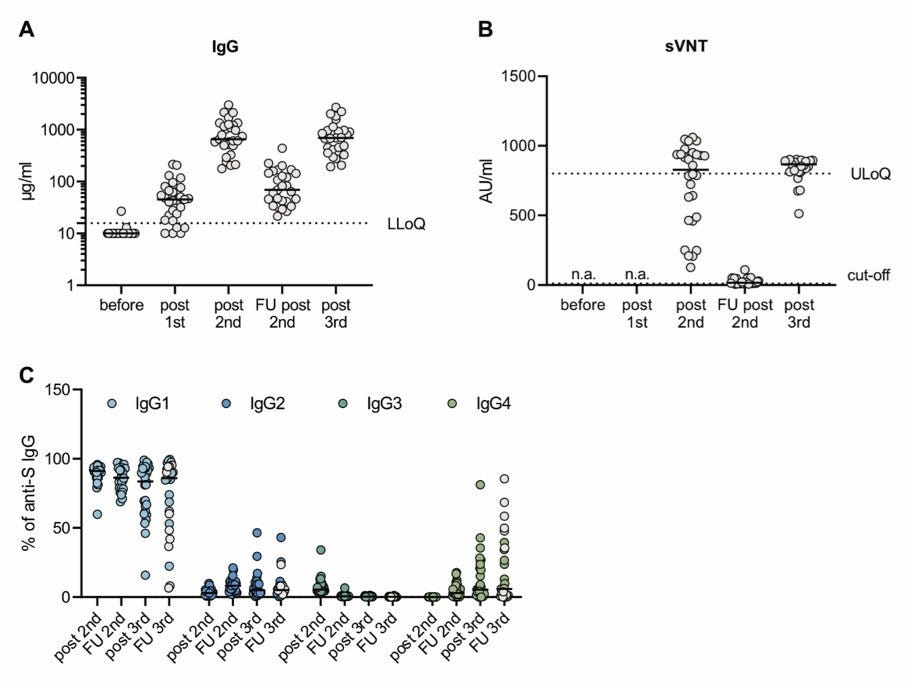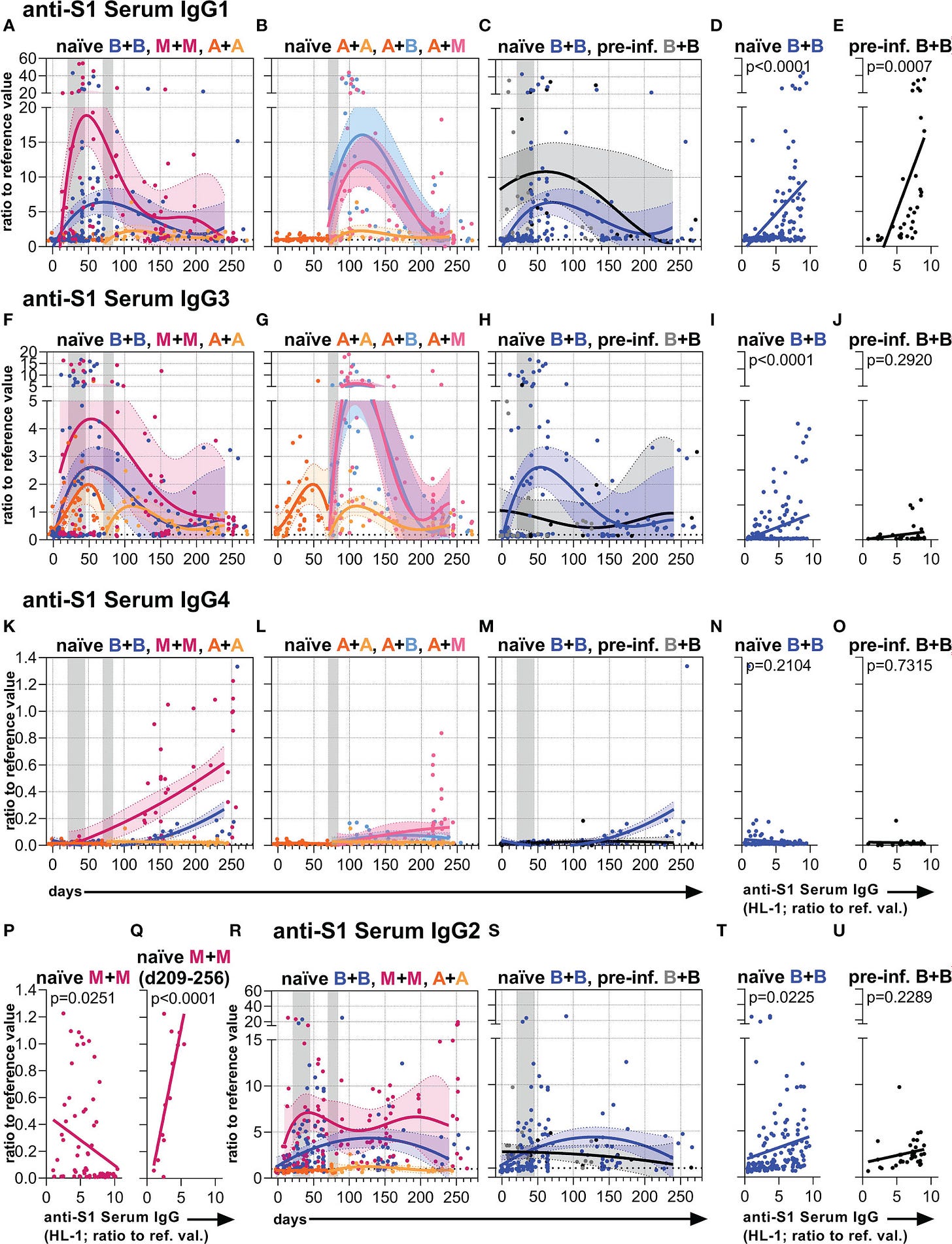I’m sure most of you will have read articles on the IgG4 immune switch by now. The concern was first highlighted in a pre-print in July 2022 which was then peer-reviewed and published in Science Immunology journal in December 2022.
Yesterday another study was published in Frontiers in Immunology confirming the results. In this article I will write a quick, simplified recap about what all this means (in my opinion) and look at this new paper.
Your immune system is an amazing and powerful process which nobody fully understands (best not mess around with it then!). It can destroy every cell in your body if it so chooses and to some degree does do this in autoimmune diseases. However, most of the time it doesn’t do this because it has the ability to recognise what is you and what isn’t you (self and non-self). It learns this whilst you are still in the womb and when you leave that sterile environment it determines that anything new it encounters must be a foreign invader. Self are the cells it encountered in the womb and non-self is anything external or internal (within your digestive system).
When a foreign object enters your body, your immune system kicks into action. One of the responses your immune system produces is the creation of antibodies, of which there are various types. Another word for an antibody is immunoglobulin or ‘Ig’. Igs are Y-shaped proteins that bind to specific antigens on the tips of the Y, which then neutralise them or flag the invader for destruction by other parts of the immune system.
(On a side note, this is an example of how mRNA vaccines can be dangerous. If your cells are given a new set of instructions to start producing spike protein, suddenly your immune system thinks these are non-self and starts attacking them.)
There are various types of antibodies, including IgM and IgG.
IgMs are the largest antibodies and first to appear when an invader tries to invade. They are produced when you breath in a virus in your mucosal membranes.
IgGs are the most common antibody in circulating blood and protect from infection. There are four types of IgG starting with IgG1 through to IgG4. IgG3 protects against bacteria, parasites and viruses and produce an inflammatory response. If you get a fever, it is likely that IgG3 antibodies are at work in your body.
IgG4, on the other hand, responds to allergens. If you get stung by a bee for example, your body might react with IgG3 or other antibodies and cause you to have an allergic reaction. To avoid this, your body learns how to recognise relatively insignificant foreign objects by switching to IgG4. Instead of increased inflammation to fight the foreign object, your immune system recognises that this is nothing major. Long term exposure, for example in bee keepers, produces this response. Immunotherapy also works this way by training your body with the foreign object you are allergic to until it is trained to produce an IgG4 response.
Unvaccinated individuals, on exposure to Sars-CoV-2, are likely to have an IgM response when the virus enters the respiratory system. A lot of the time IgM antibodies will stop the virus whilst still in the nose.
On the other hand, vaccinated individuals are trained to produce IgG3. mRNA instructs your cells to grow spike proteins and these are destroyed. This training means any future encounter with a virus with the same spike protein will produce an IgG3 response and kill the invading virus.
So, with this information in mind, what have these new studies shown?
The original study showed that after a third mRNA vaccine an immune class switch seemed to occur. On exposure to the Covid virus, instead of an IgG3 response, IgG4 was being produced instead.
The latest study, from the University of Lubeck, confirms this and in fact noticed the change after shot two.
If you look at the IgG4 section of the charts above, you can see that some individuals (dots on the chart) had IgG4 levels that were almost off the chart!
Whilst an IgG4 response is a good thing for an allergen, this is bad for a constantly replicating virus. The bee sting will quickly be removed from your body but a virus will continue replicating all over the place. And now, instead of your body trying to destroy the virus, it accepts it as nothing dangerous and doesn’t try to destroy it. Your body won’t produce an inflammatory response but it won’t clear the virus and will allow it to continue to exist and replicate within you.
For how long? Who knows. All we do really know is that mRNA vaccinated people are having an abnormal immune response that needs to be examined closely.
What are the consequences of this? Again, who knows. But empirically, it seems that this winter people are getting ill and not being able to clear whatever infection they have. Is this because their immune system has been trained to allow Covid to stay within their body? Whilst not causing them to have severe illness, it may mean that they are unable to get rid of an invading virus.
And what does this mean for other viruses? If the immune system is exhausted from constantly trying to deal with a virus that it can’t remove, does this allow other viruses to take advantage?
Fortunately we had extensive studies to show that this might happen and it’s not that bad. Oh, hold on, I forgot, warp speed, speed of science missed out this bit.
I will finish on some good news. Both studies showed that this immune class switch didn’t occur in people that had a DNA vaccine. It only occurred with the mRNA vaccines.
Secondly, the effect only happened in individuals that hadn’t previously been infected before their Covid vaccines. However, the authors note that the observation period was limited and so would need long-term samples to verify this.






Great Stuff! I'm no medic, scientist or expert in anything, and I can grasp the basics of the system at work.
Thank you for that explanation. It was very easy to understand for lay people like me.